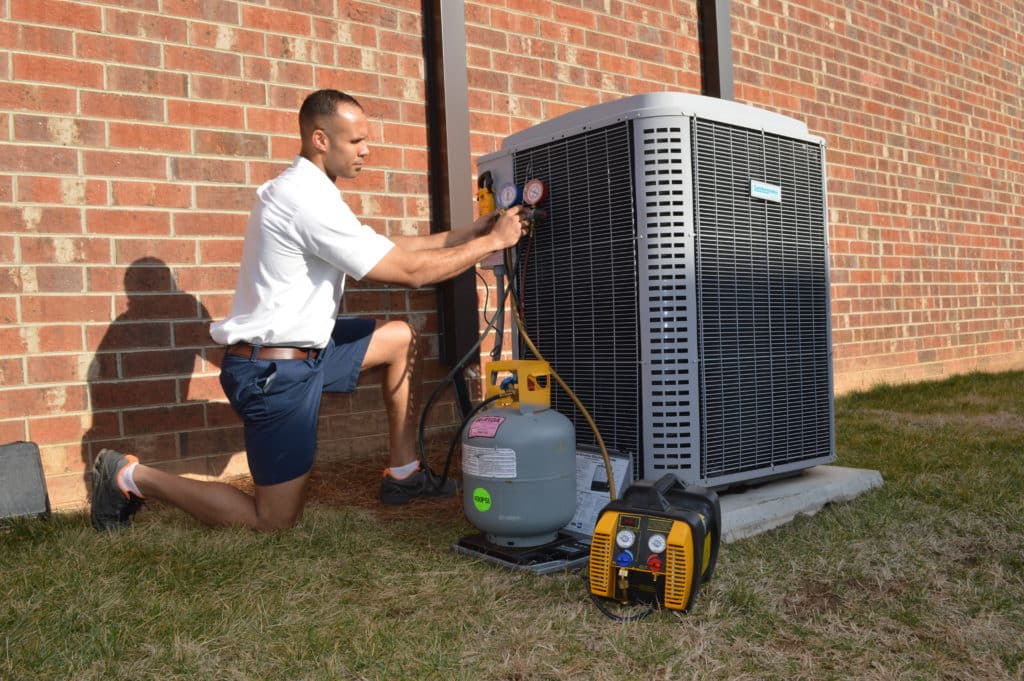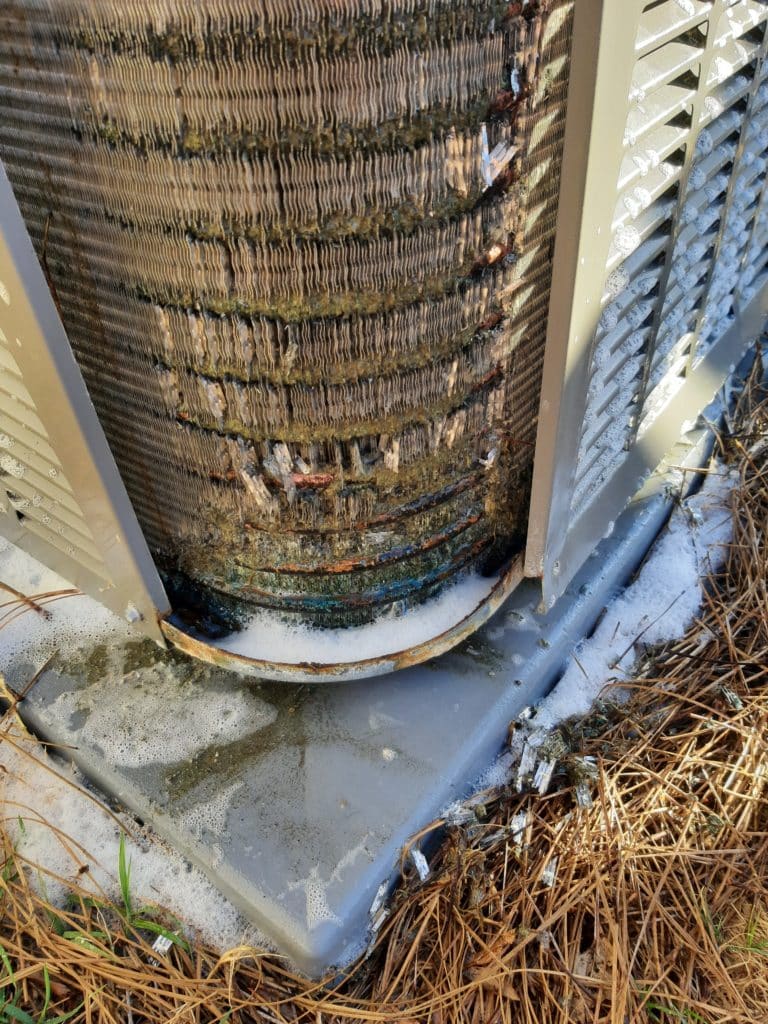Don’t you love a little warm sunshine? We sure do. It’s so nice when summer finally makes an appearance after months of cold, cloudy weather—but let’s be honest, there’s a big difference between enjoying the sun outside and sweating it out inside your home.
After a while, that Carolina heat can make you feel like a cookie in an oven, especially if your home’s AC needs to be repaired. One of the most common causes of air conditioning problems can be linked back to leaking refrigerant. Learn about the most common signs of a refrigerant leak below!
Are You Dealing With a Refrigerant Leak?
We hate to say it, but if your AC isn’t doing its job, there are plenty of different things that could be going wrong. Air conditioners are complicated systems made up of lots of different components, and with usage and wear, problems are bound to develop at some point.
Here’s how to know if it’s a refrigerant leak causing you to feel like you’re melting in your home:
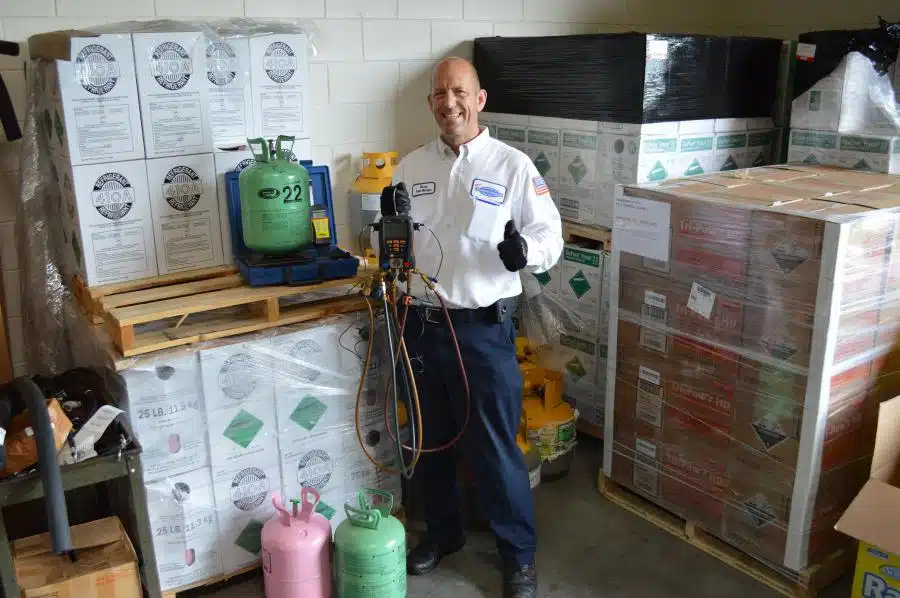
Higher Electric Bill
When your HVAC unit is leaking refrigerant, your air conditioner will do its best to cool your home, despite the lack of refrigerant. This means your AC will stay on for longer periods of time, using more electricity and raising your energy bill.
If you’re not sure if your power bill is abnormally high this year, compare it to your power bill from the same time of year last year! This is a great way to see if you’ve been using more energy this summer. Give us a call and we’ll thoroughly inspect your unit to make sure everything is working right.
Inefficient Air Conditioning
Just can’t seem to get your home to the temperature you want? That could mean you’re dealing with a refrigerant leak. It’s not the only thing that can cause a drop in efficiency, though, so be sure to also check your air filter, thermostat settings, and vents for any blockages.
But if everything else looks good and your AC still isn’t keeping up, low refrigerant might be the culprit. Without enough refrigerant, your system has to work overtime to try (and fail) to cool your home—and that can lead to higher energy bills and extra wear and tear.
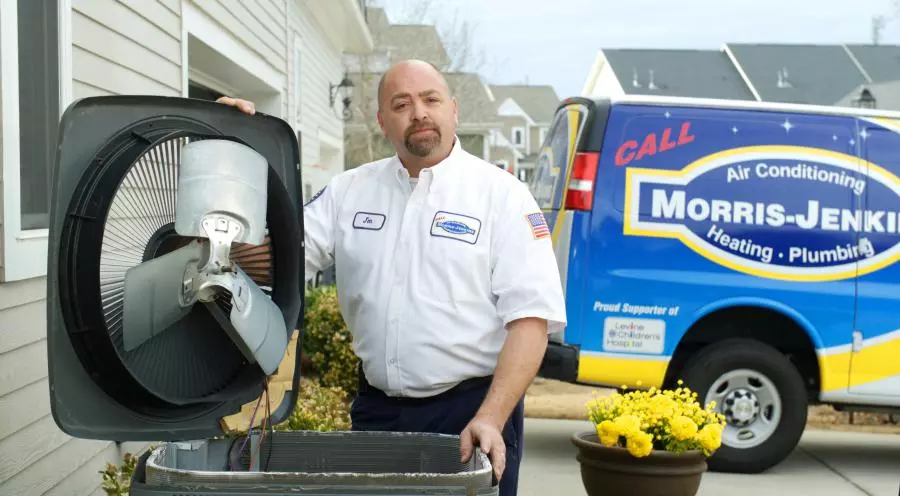
Increased Home Humidity
A warm, stuffy home that leaves you feeling sticky? Yeah, no thanks… Beyond simply cooling your air, an air conditioner is also responsible for maintaining and improving your indoor air quality.
When your system is low on refrigerant, it can’t remove heat and moisture from the air as effectively. That means your home might start to feel more like a sauna than a comfortable escape from the summer heat. If it’s constantly humid inside—even with the AC running—there’s a good chance you’ve got a refrigerant leak on your hands.
Frozen Evaporator Coil
If you run low on refrigerant, your coils can actually FREEZE! “Wait… Your coils can freeze in the middle of summer?” That’s right!
And it’s actually one of the most obvious signs of a refrigerant leak! This can happen when there’s not enough refrigerant moving through the system to absorb heat like it’s supposed to. Without that heat transfer, the moisture on the coils can freeze up, even on a hot summer day. If you notice ice on the indoor unit or your AC isn’t blowing cold air, it’s a clear sign that you’re dealing with a refrigerant leak.
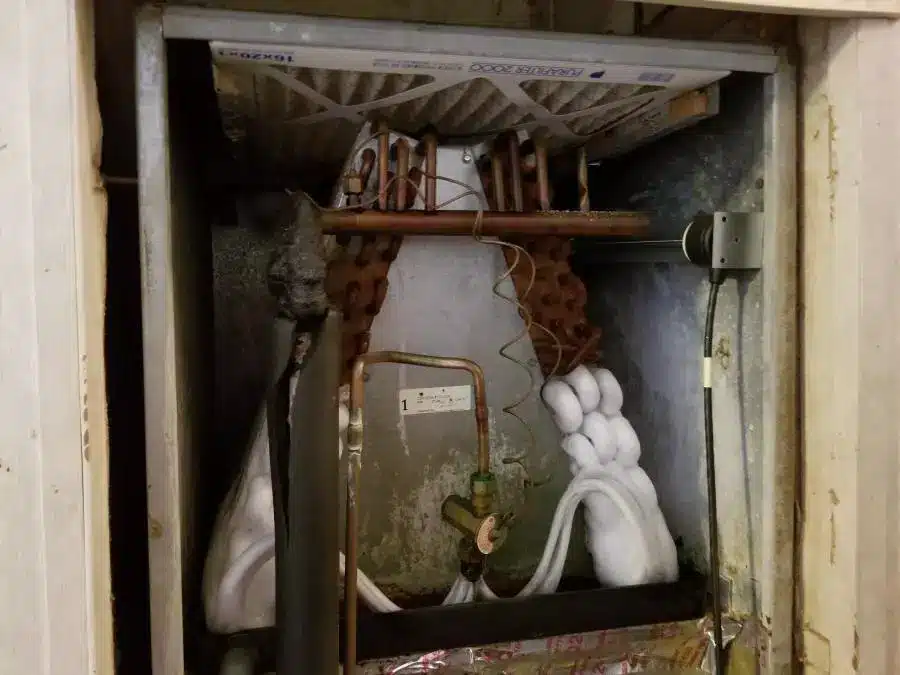
Air Conditioner Leaking Water
Remember how we said your evaporator coil can develop ice crystals? When your AC shuts off, that ice melts over time. That water has to go somewhere! Unfortunately, that water drips on the floor around your HVAC unit.
Air Conditioner Not Blowing Cold Air
Check your air vents. How cool is the air coming out of them? When your AC isn’t blowing cold air anymore, that’s a clear sign it’s time to call a professional! There are several reasons that could lead to this, but if you’re noticing several of these symptoms, there’s a good chance a refrigerant leak is to blame.
Recommended: “Ice or Frost on Your HVAC Unit”
Your AC is Making Hissing Sounds
When your refrigerant is leaking, it’s because there’s a hole or crack in your coils. If your A/C is making a hissing sound, it could be that hole or crack making noise. Have you ever squeezed a balloon with a hole in it and heard the noise it makes? Just like a balloon, your A/C will stop making this noise when all the freon leaks out.
Little Bubbles in Your Evaporator Coils
You might’ve heard that it’s normal for an air conditioner to lose refrigerant over time. This is completely false!
Your system is sealed, which means if refrigerant is low, there’s a leak somewhere—and that needs to be fixed. One telltale sign is tiny bubbles forming along your evaporator coils. These bubbles can show up when refrigerant escapes through small cracks or pinholes in the coils. It’s not always easy to spot, but it’s a red flag that something’s not right. A professional can run a leak test to confirm what’s going on and get your system back in shape.

What Causes Refrigerant Leaks?
You’ve read the symptoms, and it doesn’t sound good. Maybe you’re pretty sure you’ve got a refrigerant leak. So, what causes these pesky leaks?
Age of the System
As your unit ages, your coils can wear down and develop little holes and cracks. The joints and connections are most prone to damage over time.
Vibrations
Your unit is a powerful piece of technology that works hard to keep your family comfortable! While it’s running, it tends to vibrate a bit, and those vibrations can separate the joints in your coils, and even just a tiny separation can cause a leak.
Landscaping
Copper lines that lead from your outdoor unit to the inside of your house are prone to damage that can lead to refrigerant leaks. Some people cover these copper lines with dirt or mulch, but then they don’t see exactly where these lines are. When it comes time to mow the lawn or do other landscaping work and you’ve covered these lines, you risk stepping on them or hitting them with lawn equipment.
Contaminants
Do you keep up with regular maintenance for your HVAC unit? If you don’t know how important maintenance is, check out our article: Is HVAC Maintenance Really Worth It?
If you don’t have your unit periodically maintained, any possible coolant leaks will get worse and eventually let in pollutants. If dust and other pollutants get into your coils, it can lead to corrosion, worsening any holes and cracks in your coils!
R22 Refrigerant Phase-Out

R22 refrigerant used to be the industry standard, but it’s actually no longer manufactured in the US or imported to the US as of 2020.
So if your current air conditioner uses R22 and springs a leak, it’ll be much harder and more expensive to recharge it than homeowners who have systems that use modern refrigerants like R410A. In many cases, it may not even be worth the cost to top it off—especially since it’s only a temporary fix. That’s why a lot of homeowners with R22 systems are choosing to upgrade to newer, more efficient models.
If you’re looking to replace your air conditioner with a new system that’s compatible with R410A, give Morris-Jenkins a call! We’ll help you find and install the right system to keep your home safe and cool on even the hottest summer days!
Are Refrigerant and Freon the Same Thing?
You might’ve heard the words “refrigerant” and “freon” used interchangeably before. What’s the deal with that?
You know how sometimes, people say Kleenex to refer to tissue, Band-Aids to refer to bandages, and Q-Tips to refer to cotton swabs? It’s the same thing when people say Freon when they’re talking about refrigerant! Another name for refrigerant is “coolant.”
Enrolling in a Maintenance Plan Can Help Your HVAC System Stay in Tip-Top Shape!
Did you know there’s a way to protect your system from leaks? When you become a Priority Advantage® Member, you get two free system renovations every year! We’ve got a team of highly trained technicians on our side, and when you join a maintenance plan, they will visit your home twice a year to clean and inspect your unit, making sure everything is running as good as new.
Keeping your unit clean can help prevent damage to different components like your coils, which in turn can help prevent refrigerant leaks! Not only that, but when your technician inspects your unit, they can detect if you already have a coolant leak before things get worse.
Local Charlotte HVAC Service
HVAC systems aren’t just about comfort; on the hottest summer days, they also give you much-needed safety and security. We usually think about these systems as a luxury, but when they go out and the heat quickly sets in, it becomes clear just how essential they really are.
Nobody wants to be stuck in a hot, humid home; especially if you’ve got young kids, elderly family members, or pets. That’s why Charlotte-area homeowners count on Morris-Jenkins for fast and reliable AC repair service. We’re here til midnight to give you the solutions you need to restore comfort and safety in your home. Give us a call today to get started!
Looking for Air Conditioner Repair in Charlotte, NC? Give Morris-Jenkins a Call!
Keeping your AC unit working at its best all year round is easier said than done. It works hard to keep your home cool in the hot Charlotte summer months, and all that wear and tear can add up. Let Morris-Jenkins help you keep your home cool this summer.
Our air conditioning repair services were designed with you in mind! We’re proud to provide our neighbors with the level of service they deserve, backed by fast response times and the honest expertise they’ve come to expect. Contact us today to get started!


